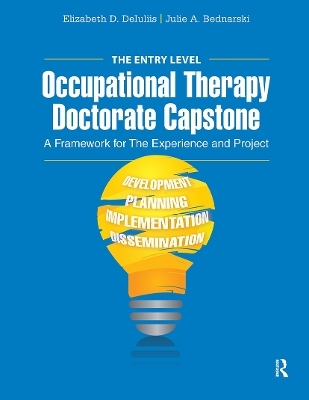
The Entry Level Occupational Therapy Doctorate Capstone
SLACK Incorporated (Verlag)
978-1-63091-611-4 (ISBN)
The first entry-level occupational therapy doctorate program was established in 1999, but even now there is a scarcity of occupational therapy resources to guide faculty, prepare students and to socialize mentors to the capstone experience and project. The Entry Level Occupational Therapy Doctorate Capstone by Drs. Elizabeth DeIuliis and Julie Bednarski is the first available resource in the field of occupational therapy devoted to the doctoral capstone.
Each chapter provides sample resources and useful documents appropriate for use with occupational therapy doctoral students, faculty, capstone coordinators and site mentors.
Included Inside:
Templates to develop the MOU, individualized doctoral student objectives, and evaluations
Examples of how to structure capstone project proposals
Learning activities to guide the literature search and development of a problem statement
Strategies of how to approach sustainability and program evaluation of the capstone project
Recommendations for structure and formatting of the final written document
Additional scholarly products derived from the project
Other scholarly deliverables including formats for professional presentations and submissible papers
The Entry Level Occupational Therapy Doctorate Capstone: A Framework for The Experience and Project will be the first of its kind to serve as a textbook to provide recommendations that will benefit various stakeholders among the capstone team.
Elizabeth D. DeIuliis is a Clinical Associate Professor and the Assistant Department Chair, Director of Community/ Clinical Education and Academic Fieldwork Coordinator at Duquesne University, which maintains dual-entry occupational therapy programs at the entry level masters and doctoral degree level in Pittsburgh, Pennsylvania. Dr. DeIuliis attended Duquesne University and graduated with a master’s degree in occupational therapy in 2004. In December 2009, she completed a post-professional doctorate of occupational therapy degree at Chatham University in Pittsburgh, Pennsylvania. She continues to practice clinically on a per diem basis at UPMC Shadyside Hospital within Centers of Rehab Services. Dr. DeIuliis is an active member of the American Occupational Therapy Association and Pennsylvania Occupational Therapy Association, and a long-standing volunteer for the National Board for Certification in Occupational Therapy (NBCOT). Dr. DeIuliis completed the AOTA Academic Leadership Institute and earned the credential Certified Academic Leader (CLA) in 2018. Julie A. Bednarski is currently a Clinical Associate Professor and the Associate Program Director in the Department of Occupational Therapy at Indiana University in Indianapolis, Indiana. Prior to joining the faculty at Indiana University, she was an Associate Professor, the Doctoral Capstone Coordinator, and Assistant Director of the School of Occupational Therapy at the University of Indianapolis. Dr. Bednarski graduated from Boston University in 1986 with her Bachelor of Science in Occupational Therapy. She went on to receive her master’s in health science at the University of Indianapolis in 1996. In December 2010, she received her post-professional doctorate in Occupational Therapy at Chatham University in Pittsburgh, Pennsylvania. Dr. Bednarski has more than 30 years of clinical experience. She is an active volunteer for the NBCOT. It was through committee work at NBCOT that Dr. Bednarski and Dr. DeIuliis became friends and colleagues and began this book collaboration. Dr. Bednarski has presented at state and national conferences on topics including occupational justice, teaching methodologies, and community practice, among others. Dr. Bednarski is passionate about the doctoral capstone and the positive impact this experience has on students, clients, sites, and the profession.
Part I: Development Chapter 1: Roles, Responsibilities, and Expectations for the Capstone Chapter 2: Understanding the ACOTE Areas of Focus for the Capstone Chapter 3: Synthesizing the Evidence: A Process to Determine a Course of Action for the Capstone Chapter 4: Capstone Site Development and Communication Part II: Planning Chapter 5: Practice-Ready Skills for the Capstone Chapter 6: Finalizing the Planning Phase With the Capstone Team Part III: Implementation Chapter 7: Capstone Project Management Chapter 8: Supporting Sustainability of the Capstone Project Through Program Evaluation Chapter 9: Evaluation of the Capstone Experience Part IV: Dissemination Chapter 10: Suggested Components of the Final Capstone Report Chapter 11: Scholarly Deliverables and Impact of the Capstone
| Erscheinungsdatum | 31.10.2019 |
|---|---|
| Verlagsort | Thorofare |
| Sprache | englisch |
| Maße | 216 x 279 mm |
| Gewicht | 725 g |
| Themenwelt | Medizin / Pharmazie ► Physiotherapie / Ergotherapie ► Ergotherapie |
| Sozialwissenschaften ► Pädagogik ► Erwachsenenbildung | |
| ISBN-10 | 1-63091-611-0 / 1630916110 |
| ISBN-13 | 978-1-63091-611-4 / 9781630916114 |
| Zustand | Neuware |
| Haben Sie eine Frage zum Produkt? |
aus dem Bereich


